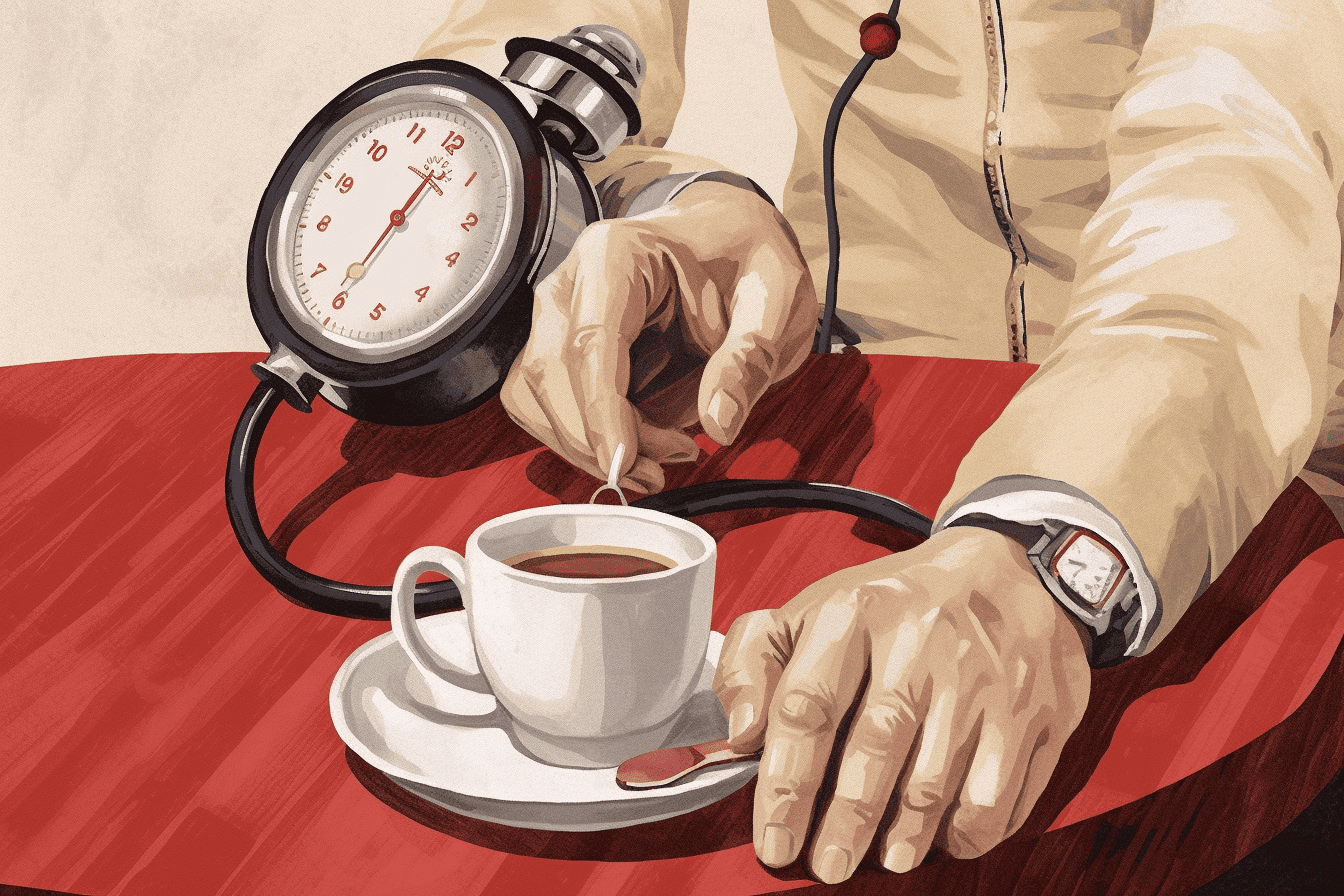Coffee
Unveiling the Perilous Brew: The Relationship Between Coffee and High Blood Pressure

Oh, coffee, my beloved morning elixir. Little did I know that my cherished brew could be hiding a dark secret: an unsettling connection to high blood pressure.
As an avid coffee drinker, the irony of this revelation hit me like a jolt of caffeine. In this article, we will dive into the evidence-backed relationship between coffee and hypertension, debunking myths along the way.
Brace yourself for the unveiling of the perilous brew that may be lurking in your daily routine.
Key Takeaways
- Coffee consumption is not directly linked to high blood pressure.
- Moderate coffee intake may have a protective effect on heart health and reduce the risk of cardiovascular diseases.
- Individual responses to coffee can vary, and those with high blood pressure should consult healthcare providers.
- Coffee alternatives such as herbal teas and decaffeinated beverages can be considered for individuals with hypertension.
The Role of Caffeine in Blood Pressure Regulation
I’ve always wondered how caffeine affects my blood pressure. When I consume coffee or other caffeinated beverages, I often feel a temporary increase in my heart rate and alertness. This led me to question the underlying mechanisms at play.
Caffeine is known to block adenosine receptors in the brain, which can lead to increased neuronal activity and the release of adrenaline. This activation of the sympathetic nervous system is believed to contribute to the rise in blood pressure that some individuals experience after consuming caffeine.
However, it’s important to note that the effects of caffeine on blood pressure can vary depending on factors such as individual metabolism and tolerance. Understanding the impact of coffee consumption on hypertension risk requires a comprehensive exploration of various factors, including caffeine intake, genetics, and lifestyle choices.
Understanding the Impact of Coffee Consumption on Hypertension Risk
I often wonder how coffee consumption affects my risk of developing hypertension, and I’m curious to learn more about the impact it may have. Understanding the relationship between coffee and hypertension is crucial for those who enjoy their daily cup of joe.
Here are some key points to consider:
-
Coffee consumption and heart health:
-
Studies suggest that moderate coffee intake may have a protective effect on heart health.
-
Antioxidants found in coffee may reduce inflammation and improve blood vessel function.
-
Regular coffee consumption has been associated with a lower risk of cardiovascular diseases.
-
The relationship between caffeine and hypertension:
-
Caffeine intake can cause a temporary increase in blood pressure.
-
However, this effect is often short-lived and may not significantly contribute to long-term hypertension.
-
Individual sensitivity to caffeine may vary, and some people may experience a stronger blood pressure response.
Exploring the Link Between Coffee and Elevated Blood Pressure
As someone who enjoys their daily cup of joe, I’ve always been curious about the link between coffee and elevated blood pressure. It’s a topic that has generated much discussion and conflicting information.
However, through exploring coffee consumption and its potential impact on blood pressure, we can gain a better understanding of this correlation. Studies have shown that coffee does have a short-term effect on blood pressure, with a slight increase observed after consumption. However, this effect tends to be temporary and may not have a significant impact on overall blood pressure levels in the long term.
In fact, some research suggests that moderate coffee intake could potentially provide certain health benefits, such as reduced risks of cardiovascular disease and type 2 diabetes.
It’s important to note that individual responses to coffee can vary, and those with existing high blood pressure or other health conditions should consult with their healthcare provider to determine the appropriate level of coffee consumption for them.
Unraveling the Myths: Does Coffee Really Cause High Blood Pressure
After examining the evidence and considering various perspectives, it’s clear that coffee doesn’t directly cause high blood pressure, but rather its effects on blood pressure are temporary and may not contribute significantly to long-term hypertension. In fact, coffee consumption has been associated with several health benefits.
Here are three important points to consider:
- Moderate coffee consumption has been linked to a reduced risk of developing type 2 diabetes.
- Coffee contains antioxidants that may help protect against certain types of cancer, such as liver and colorectal cancer.
- Some studies suggest that coffee consumption may decrease the risk of developing neurodegenerative diseases like Parkinson’s and Alzheimer’s.
While these findings are promising, it’s important to note that individuals with hypertension may need to explore alternative options to coffee.
Transitioning to the subsequent section, let’s now explore some coffee alternatives for individuals with hypertension.
Coffee Alternatives for Individuals With Hypertension
Exploring the benefits of herbal teas or decaffeinated beverages can provide individuals with hypertension a satisfying alternative to coffee.
Herbal remedies, such as chamomile, ginger, and hibiscus teas, have been shown to have various health benefits, including reducing blood pressure. These teas contain natural compounds that may help relax blood vessels and improve blood flow, ultimately leading to a decrease in blood pressure levels.
Decaffeinated beverages, like herbal teas or even decaf coffee, can provide a similar taste and experience without the stimulating effects of caffeine.
Additionally, making lifestyle changes, such as incorporating regular exercise, maintaining a healthy weight, and reducing sodium intake, can further support the management of hypertension.
It’s important to consult with a healthcare professional to determine the best approach for managing high blood pressure and incorporating these alternatives into your diet.
Frequently Asked Questions
What Are Some Common Symptoms of High Blood Pressure?
Some common symptoms of high blood pressure include headaches, dizziness, shortness of breath, and chest pain. Certain types of coffee, such as decaf or lower-caffeine options, are less likely to raise blood pressure.
Are There Any Specific Types of Coffee That Are Less Likely to Raise Blood Pressure?
There are specific types of coffee that are less likely to raise blood pressure. Some studies suggest that decaffeinated coffee and certain blends with lower caffeine content may have fewer negative effects on blood pressure.
Can Drinking Decaffeinated Coffee Still Increase the Risk of Hypertension?
Drinking decaffeinated coffee can still increase the risk of hypertension. Despite the absence of caffeine, decaf coffee contains other compounds that may affect blood pressure. It’s important to consider all aspects of coffee’s health benefits.
How Long Does It Take for Coffee to Affect Blood Pressure Levels?
Coffee consumption can impact cardiovascular health and the regulation of blood pressure due to the effects of caffeine. It’s important to understand how long it takes for coffee to affect blood pressure levels for proper management.
Are There Any Natural Remedies or Lifestyle Changes That Can Help Lower Blood Pressure in Addition to Reducing Coffee Consumption?
Yes, there are natural remedies and lifestyle changes that can help lower blood pressure. These include dietary modifications, exercise routines, stress management techniques, meditation practices, relaxation techniques, herbal supplements, and yoga poses.
Conclusion
In conclusion, while there’s a link between coffee consumption and elevated blood pressure, it’s important to understand that the relationship is complex and influenced by numerous factors.
Contrary to popular belief, coffee alone doesn’t cause high blood pressure. Moderation and individual sensitivity play crucial roles.
Therefore, individuals with hypertension can still enjoy coffee in moderation, but should also explore alternative beverages to manage their blood pressure effectively.
Noah, the Editor-in-Chief at Cappuccino Oracle, plays a pivotal role in shaping the voice and vision of our renowned platform. With an unwavering passion for coffee, coffee alternatives, and tea, Noah leads Cappuccino Oracle towards new horizons in the realm of coffee journalism.
Beyond his professional responsibilities, Noah serves as a mentor and guiding force for his team. His dedication to journalistic excellence and genuine love for coffee, coffee alternatives, and tea continue to inspire and motivate the Cappuccino Oracle family. In the ever-evolving world of these beverages, Noah’s leadership ensures that our platform remains at the forefront, delivering enlightening and enjoyable content to our readers worldwide.
Coffee
Ultimate Guide To Coffee Freshness

Were you aware that around 64% of people in the United States enjoy a minimum of one coffee cup daily?
As a coffee lover myself, I understand the importance of starting the day with a fresh, flavorful cup of joe. That’s why I’m excited to share with you the ultimate guide to coffee freshness.
In this comprehensive article, we will explore everything you need to know to ensure that your coffee stays fresh and delicious for as long as possible. From expert storage tips that prevent oxidation and preserve flavor, to the option of having fresh coffee delivered straight to your doorstep, we’ve got you covered.
Plus, we’ll provide you with some incredible recipe ideas to take your coffee routine to the next level.
So grab your favorite mug and let’s dive into the world of coffee freshness together.
Key Takeaways
- Proper storage in an airtight container is essential for preserving coffee freshness.
- Ceramic, glass, or stainless steel containers with tight-fitting lids are ideal for storing coffee.
- It is important to keep coffee away from heat sources and sunlight to maintain freshness.
- Fresh coffee delivery, coffee subscription services, buying in bulk, or purchasing from local roasters are options to ensure you always have freshly roasted beans.
Storage Tips
I store my coffee in a dry place at room temperature to prevent condensation and oxidation. Proper coffee preservation is crucial to maintaining its freshness and flavor. To achieve this, it’s important to choose the right coffee container. Look for an airtight container that can keep out moisture and air, as these elements can rapidly deteriorate the quality of your coffee.
Options like ceramic, glass, or stainless steel containers with tight-fitting lids are ideal. Avoid storing coffee in containers made of plastic or clear glass, as they may not provide the same level of protection. Additionally, make sure to keep your coffee away from heat sources and sunlight, as they can also affect its taste and aroma.
By following these storage tips, you can ensure that your coffee stays fresh for longer.
Fresh Coffee Delivery
Delivering fresh coffee to your doorstep may be a convenient solution, but be prepared to pay a premium price. With regular deliveries, you can ensure that you always have the freshest coffee available without having to go to the store. This can be especially beneficial for coffee enthusiasts who prioritize freshness and flavor.
Pros of fresh coffee delivery:
- Convenience: No need to go to the store or worry about running out of coffee.
- Freshness: You’ll always have freshly roasted beans delivered to your doorstep.
- Variety: Many coffee subscription services offer a wide range of coffee flavors and origins to choose from.
Cons of fresh coffee delivery:
- Cost: Regular deliveries can be expensive, especially compared to buying coffee in bulk.
- Dependency: You become reliant on the delivery service and may need to adjust your schedule accordingly.
Cost-effective alternatives to fresh coffee delivery include buying coffee in larger quantities and storing it properly, or purchasing coffee from local roasters or specialty shops. These options can still provide you with quality coffee without the premium price tag.
Recipe Ideas
Elevate your coffee routine with an easy recipe for Vanilla Cold Foam Iced Coffee. This refreshing drink combines the smoothness of vanilla with the rich flavors of coffee, creating a delightful treat for any time of day. To make this recipe, simply brew your favorite coffee and let it cool. In a separate container, mix together milk, vanilla extract, and a touch of sweetener if desired. Using a frother or blender, whip the mixture until it becomes light and frothy. Pour the chilled coffee into a glass filled with ice, then top it off with the creamy vanilla foam. The result is a low-sugar, indulgent beverage that will satisfy your cravings without the guilt.
To further enhance your coffee experience, consider exploring coffee-based desserts. From low-sugar mocha Twix bars to high-protein tiramisu mocha milkshakes, there are plenty of options to satisfy your sweet tooth. These desserts incorporate the rich flavors of coffee into delicious treats that can be enjoyed alongside your favorite brew. So why not take your coffee routine to the next level by indulging in these delectable creations? With the right recipes and a little creativity, you can transform your daily cup of joe into a truly memorable experience.
Frequently Asked Questions
How does the freshness of coffee affect its taste?
When it comes to coffee freshness, it’s like a symphony of flavors dancing on your taste buds. Fresh coffee boasts an irresistible aroma and a vibrant flavor profile. To preserve this magic, store it in a dry place at room temperature, away from heat and humidity. Avoid the cabinet above the stove—it’s a flavor assassin. And if you’re a coffee connoisseur, consider having fresh coffee regularly delivered to your home for that unbeatable freshness. It may be a bit pricey, but oh, so worth it.
What are the different factors that can contribute to the degradation of coffee freshness?
Factors affecting coffee freshness include exposure to heat, temperature changes, humidity, and oxidation. To extend coffee shelf life, store it in a dry place at room temperature, away from the stove. Avoid condensation and speed up oxidation.
Are there any specific storage containers or methods that can help prolong the freshness of coffee?
To preserve the freshness of coffee, using airtight storage containers, such as vacuum-sealed canisters, is crucial. These containers protect the coffee beans from exposure to air, moisture, and light, ensuring optimal flavor and aroma preservation.
Can the type or roast level of coffee impact its shelf life?
Yes, the type and roast level of coffee can impact its shelf life. Lighter roasts generally have a shorter shelf life than darker roasts due to higher acidity. Additionally, whole bean coffee generally lasts longer than pre-ground coffee.
Are there any tips or techniques for properly brewing coffee to maximize its freshness and flavor?
To maximize the freshness and flavor of your coffee, focus on brewing techniques and extraction methods. Pay attention to factors like water temperature, grind size, and brewing time. These meticulous details can greatly enhance your coffee experience.
Arf, an author and an innovative enthusiast of coffee, coffee alternatives, and tea, plays a crucial role as a contributor to the esteemed Cappuccino Oracle platform. Renowned for his curiosity and passion for these captivating beverages, Arf has carved out a unique space for himself in the world of exploration and writing. He realized that coffee, coffee alternatives, and tea are not mere drinks to keep one awake, but universes of flavors and stories waiting to be explored.
Arf’s articles for Cappuccino Oracle blend meticulous research with personal experiences, providing readers with an in-depth understanding of various types of coffee, coffee alternatives, and tea, along with their unique characteristics, cultures, and histories. His honest reviews and engaging narratives guide readers on their own journeys, helping them discover their preferences and find their perfect brew.
Coffee
Ultimate Keto Coffee: A Low-Carb Morning Delight

I enjoy kicking off my day with a tasty cup of keto coffee. It’s an ideal method to get my day going while adhering to my low-carb way of living.
Keto coffee is a simple and easy-to-make drink that combines hot coffee with healthy fats like MCT oil and grass-fed butter or ghee. The combination of these ingredients not only provides a creamy and satisfying texture but also helps promote ketosis and fat burning.
But what makes keto coffee truly delightful is the endless variations and flavors you can experiment with. From adding keto creamer and monk fruit extract to indulging in flavors like mocha or salted caramel, there’s a keto coffee recipe for every taste bud.
Plus, for those days when I’m on the go, there are even ready-made options like Super Coffee that offer the same benefits without the hassle.
So, if you’re looking for a low-carb morning delight, give keto coffee a try and experience a delicious way to start your day.
Key Takeaways
- Keto coffee is made with hot coffee, MCT oil, and grass-fed butter or ghee
- Customization options for keto coffee include different variations, flavors, creamers, sweeteners, and additional flavors
- Convenience options for keto coffee include ready-made options like Super Coffee
- Keto coffee has benefits such as low carb content and considerations such as the potential for lack of dietary variety and digestive issues with excessive consumption
What is it?
Keto coffee is a delicious and low-carb morning treat that can be made with hot coffee, MCT oil, and grass-fed butter or ghee. It’s a popular choice among those following a ketogenic diet due to its numerous benefits.
MCT oil, derived from coconut oil, aids in ketosis and fat burning. Grass-fed butter or ghee provides healthy fats that help keep you full and satisfied.
There are different ways to prepare keto coffee to suit your taste preferences. Some people simply blend hot coffee with MCT oil and butter or ghee. Others like to add keto creamers, such as heavy cream or non-dairy milks, for a creamier texture. Sweeteners like stevia or monk fruit extract can be added for a touch of sweetness. You can also enhance the flavor by adding cocoa powder, cinnamon, vanilla extract, or even protein powder.
Overall, keto coffee is a convenient and tasty way to start your day while staying on track with your low-carb lifestyle. Just remember not to consume it excessively, as it’s still important to maintain a balanced diet.
Pros and Cons
While it may have its benefits, there are some drawbacks to incorporating this popular beverage into your daily routine.
-
Low carb benefits: One of the main advantages of keto coffee is its low carb content. By using ingredients like MCT oil and grass-fed butter, it provides a source of healthy fats without the added carbohydrates. This can be beneficial for those following a ketogenic diet or looking to reduce their overall carb intake.
-
Potential drawbacks: However, it’s important to note that keto coffee shouldn’t be consumed excessively. While it can be a satisfying morning treat, relying too heavily on this beverage may lead to a lack of variety in your diet and potentially nutrient deficiencies. Additionally, some people may experience digestive issues or an upset stomach when consuming high amounts of MCT oil or butter.
-
It’s always important to listen to your body and find a balance that works for you when incorporating keto coffee into your routine. As with any dietary change, it’s best to consult with a healthcare professional or registered dietitian to ensure it aligns with your individual needs and goals.
Variations and Recipes
I enjoy experimenting with different flavors and recipes when making my morning cup of keto coffee. There are so many variations and creative keto coffee recipes to try!
One of my favorites is the Low-sugar Smores Iced Latte. It combines the rich flavors of chocolate and marshmallow with a hint of coffee.
Another delicious option is the Vanilla Cold Foam Iced Coffee. It has a creamy texture and a subtle vanilla taste that’s simply delightful.
For those looking for a protein-packed option, the High Protein Tiramisu Mocha Milkshake is a must-try. It blends the flavors of coffee, chocolate, and mascarpone cheese to create a decadent treat.
And if you have a sweet tooth, the Low Carb & Low Sugar Salted Caramel Donuts and the Low Sugar Mocha Twix Bars are the perfect keto-friendly indulgences.
With so many variations and recipes to choose from, keto coffee never gets boring!
Frequently Asked Questions
How many grams of carbohydrates are typically in a serving of keto coffee?
In a typical serving of keto coffee, the carbohydrate content is extremely low, usually less than 1 gram. This allows you to enjoy a delicious and creamy morning treat without worrying about disrupting your low-carb diet.
Can keto coffee be consumed on a non-ketogenic diet?
Keto coffee can provide benefits for energy levels due to the MCT oil and healthy fats. While it may help with weight loss on a non-ketogenic diet, it’s important to consider overall calorie intake and other dietary factors.
Are there any potential side effects of consuming MCT oil in keto coffee?
Using MCT oil in keto coffee may have potential side effects like digestive issues or increased heart rate, but it also offers health benefits such as aiding ketosis and boosting fat burning.
Can keto coffee be a replacement for breakfast?
Keto coffee can serve as an appetite suppressant, making it a potential replacement for breakfast. Intermittent fasting with keto coffee may offer benefits such as improved fat burning and increased mental clarity.
Is it necessary to use grass-fed butter or ghee in keto coffee, or can regular butter be used as well?
Using grass-fed butter or ghee in keto coffee provides added health benefits due to their higher nutrient content. While regular butter can be used, opting for grass-fed or ghee enhances the nutritional value of the beverage.
Arf, an author and an innovative enthusiast of coffee, coffee alternatives, and tea, plays a crucial role as a contributor to the esteemed Cappuccino Oracle platform. Renowned for his curiosity and passion for these captivating beverages, Arf has carved out a unique space for himself in the world of exploration and writing. He realized that coffee, coffee alternatives, and tea are not mere drinks to keep one awake, but universes of flavors and stories waiting to be explored.
Arf’s articles for Cappuccino Oracle blend meticulous research with personal experiences, providing readers with an in-depth understanding of various types of coffee, coffee alternatives, and tea, along with their unique characteristics, cultures, and histories. His honest reviews and engaging narratives guide readers on their own journeys, helping them discover their preferences and find their perfect brew.
Coffee
The Unifying Power Of Morning Coffee

Ah, the scent of just-brewed coffee in the morning feels like a comforting hug for my spirit. There’s a unique quality to that initial gulp that unites people, no matter our disparities.
Coffee has this unifying power that transcends borders and cultures. From the bustling streets of New York City to the serene cafes of Paris, morning coffee is a ritual that connects us all.
Statistics show that the majority of American adults start their day with a cup of joe, seeking that jolt of energy to kickstart their mornings. Whether it’s a rich espresso or a smooth cold brew, coffee has become an essential part of our daily routine. And while preferences may vary, with some enjoying it black and others adding a splash of cream and sugar, the love for this magical elixir remains the same.
In this article, we will explore the diverse world of morning coffee, from its different varieties to the various ways it can be enjoyed. So grab your favorite mug and join me on this caffeinated journey as we delve into the unifying power of morning coffee.
Key Takeaways
- Morning coffee is a unifying factor in today’s divided world.
- Coffee consumption is high, with 62% of American adults drinking coffee every day.
- Coffee contains caffeine, a powerful stimulant that enhances alertness and cognitive performance.
- Coffee preferences vary, with many people using artificial creamers and sweeteners, but healthier alternatives like bulletproof coffee and Super Coffee are gaining popularity.
The Unifying Power of Morning Coffee:
I can attest to the unifying power of morning coffee as it brings together people from all walks of life. With 62% of American adults joining me in enjoying a cup every day, coffee culture has become a significant part of our society. It serves as a platform for social bonding and connection.
Whether it’s a quick chat with a coworker at the office coffee machine or meeting up with friends for a coffee date, these interactions foster a sense of community. Coffee shops have become communal spaces where people gather, share ideas, and engage in conversations. The act of sharing a cup of coffee can break down barriers and create a sense of camaraderie.
No matter our differences, morning coffee has the power to bring us together and foster a sense of unity in a divided world.
Coffee as a Daily Ritual
Starting the day with a steaming cup of java has become a cherished daily tradition for many, bringing comfort and a sense of familiarity to the hustle and bustle of life. Coffee, with its rich aroma and invigorating taste, has the power to awaken the senses and provide a much-needed boost of energy.
One of the main benefits of caffeine found in coffee is its ability to enhance mental clarity. Caffeine acts as a stimulant, blocking adenosine receptors in the brain and preventing tiredness. This leads to increased alertness, improved memory performance, and better information processing. By starting our day with coffee, we can feel more focused and ready to tackle the challenges ahead.
So, whether it’s a simple black brew or a fancy flavored latte, coffee has the potential to not only unite us in our love for a morning ritual but also improve our cognitive function and mental well-being.
Coffee Preferences and Varieties
One popular option for coffee drinkers is to add artificial creamers and sweeteners to their cup of joe. While some people enjoy the simplicity of black coffee, many others prefer to enhance the flavor and sweetness.
There are a variety of coffee flavors available to cater to different taste preferences. From classic options like vanilla and caramel to more unique flavors like hazelnut or cinnamon, there is something for everyone.
In addition to different flavors, alternative coffee drinks have gained popularity in recent years. These include options like iced lattes, cold brews, and even protein-infused coffee beverages. These alternatives provide a refreshing twist to the traditional cup of coffee and offer a wider range of choices for coffee enthusiasts.
Frequently Asked Questions
How does the unifying power of morning coffee impact different cultures around the world?
The cultural significance of morning coffee is evident in global coffee consumption. It brings people together, transcending borders and differences. It’s a shared experience that fosters connection and understanding among diverse cultures.
Is there a correlation between the consumption of morning coffee and productivity levels?
There is a correlation between the consumption of morning coffee and productivity levels. Studies show that caffeine enhances alertness, memory performance, and information processing, leading to increased productivity.
What are some unique morning coffee traditions or rituals in different countries?
Morning coffee traditions vary across cultures. In Italy, they enjoy espresso shots. In Turkey, they drink strong, black coffee. In Japan, they have a tea-like coffee called "siphon." These traditions reflect the cultural significance of morning coffee.
Are there any health benefits associated with drinking morning coffee?
Yes, there are health benefits associated with drinking morning coffee. It contains caffeine, which can enhance alertness and cognitive performance. However, it’s important to consume it in moderation and be mindful of any potential negative effects.
How does the unifying power of morning coffee extend beyond personal relationships to the workplace or social settings?
The unifying power of morning coffee extends beyond personal relationships to the workplace and social settings. Morning coffee in community fosters connection, encourages collaboration, and serves as a social lubricant, facilitating interactions and promoting a sense of belonging.
Conclusion
In conclusion, morning coffee has truly become a unifying force in our society. It’s not just a beverage, but a daily ritual that brings people together. Whether you prefer it black, with cream and sugar, or as a bulletproof coffee, there’s a flavor and variety for everyone.
The energy boost and cognitive benefits of coffee are undeniable, making it the perfect companion to start your day. So grab a cup, join the millions of coffee drinkers, and let the unifying power of morning coffee awaken your senses and bring people together, one sip at a time.
Cheers!
Arf, an author and an innovative enthusiast of coffee, coffee alternatives, and tea, plays a crucial role as a contributor to the esteemed Cappuccino Oracle platform. Renowned for his curiosity and passion for these captivating beverages, Arf has carved out a unique space for himself in the world of exploration and writing. He realized that coffee, coffee alternatives, and tea are not mere drinks to keep one awake, but universes of flavors and stories waiting to be explored.
Arf’s articles for Cappuccino Oracle blend meticulous research with personal experiences, providing readers with an in-depth understanding of various types of coffee, coffee alternatives, and tea, along with their unique characteristics, cultures, and histories. His honest reviews and engaging narratives guide readers on their own journeys, helping them discover their preferences and find their perfect brew.
-

 Americano4 weeks ago
Americano4 weeks agoHow to Make Americano With Moka Pot
-

 Americano2 weeks ago
Americano2 weeks agoHow to Make Korean Iced Americano
-

 Americano4 weeks ago
Americano4 weeks agoHow to Make Iced Americano With Instant Coffee
-

 Americano4 weeks ago
Americano4 weeks agoHow to Make Americano With Bialetti
-

 Americano4 weeks ago
Americano4 weeks agoHow to Make Dutch Bros Americano
-

 Americano6 days ago
Americano6 days agoHow to Make an Iced Americano With Nespresso
-

 Americano2 weeks ago
Americano2 weeks agoHow Many Shots of Espresso for 16 Oz Americano
-

 Americano4 weeks ago
Americano4 weeks agoHow to Make a Hazelnut Americano

















